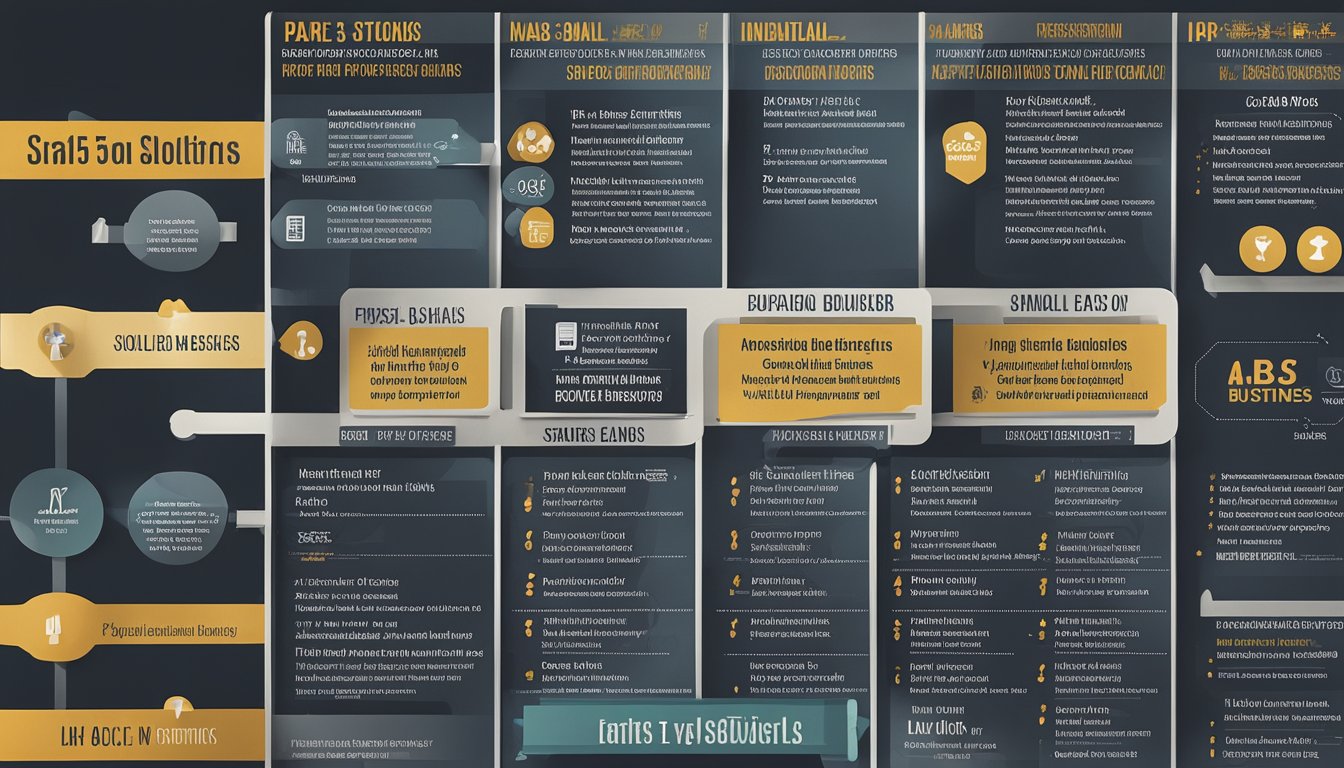
Top 5 iPaaS Solutions for Small Businesses Streamline Your Operations Today
As a small business owner, you know how important it is to streamline your processes and optimize your operations. One way to do this is by using iPaaS solutions. iPaaS, or Integration Platform as a Service, is a cloud-based platform that helps busin
As a small business owner, you know how important it is to streamline your processes and optimize your operations. One way to do this is by using iPaaS solutions. iPaaS, or Integration Platform as a Service, is a cloud-based platform that helps businesses integrate their applications, data, and processes. By using iPaaS, small businesses can save time and money while increasing efficiency and productivity.

In this article, I will introduce you to the top 5 iPaaS solutions for small businesses. I will provide an overview of each solution, including its key features and benefits. By the end of this article, you will have a better understanding of iPaaS solutions and be able to choose the best one for your business needs.
Key Takeaways
- iPaaS solutions can help small businesses streamline their processes and optimize their operations.
- The top 5 iPaaS solutions for small businesses are [insert solution names here].
- When choosing an iPaaS solution, consider factors such as ease of use, scalability, and pricing.
Understanding iPaaS: Definition and Importance

As a small business owner, you may have heard of iPaaS or Integration Platform as a Service. iPaaS is a cloud-based platform that enables businesses to connect various applications, systems, and data sources together seamlessly. It acts as a middleware layer, facilitating the integration and communication between different software components.
The importance of iPaaS lies in its ability to automate processes and streamline workflows. With iPaaS, small businesses can integrate their existing applications and systems, enabling them to work together in a more efficient and effective manner. This can help reduce manual errors and improve data accuracy, leading to better decision-making and increased productivity.
One of the key benefits of iPaaS is its cloud-based nature. This means that small businesses can access their integrated systems and data from anywhere, at any time, using any device with an internet connection. This not only improves accessibility but also reduces the need for expensive hardware and software installations.
Another advantage of iPaaS is its scalability. As small businesses grow, their software needs may change, and new applications may need to be integrated. iPaaS allows for easy scalability, enabling businesses to add or remove integrations as needed.
In summary, iPaaS is a cloud-based integration platform that enables small businesses to connect their applications, systems, and data sources together seamlessly. Its importance lies in its ability to automate processes, streamline workflows, improve data accuracy, and increase productivity. Its cloud-based nature and scalability make it an attractive option for small businesses looking to improve their software integration capabilities.
Top 5 iPaaS Solutions for Small Businesses

As a tech-savvy entrepreneur, I understand the importance of having a robust and efficient iPaaS solution to streamline business operations. After thorough research and analysis, I have compiled a list of the top 5 iPaaS solutions for small businesses that offer seamless integration, automation, and scalability.
1. Boomi
Boomi, a Dell Technologies product, is a cloud-based iPaaS solution that offers a comprehensive suite of tools for data integration, API management, and workflow automation. With Boomi, small businesses can easily connect their on-premises and cloud-based applications, automate business processes, and gain real-time insights into their data. Boomi's user-friendly interface and drag-and-drop functionality make it easy for non-technical users to create and manage integrations.
2. Zapier
Zapier is a popular iPaaS solution that allows small businesses to connect over 3,000 web applications and automate workflows. With Zapier, users can create "Zaps," which are automated workflows that trigger actions in one application based on events in another. Zapier's pricing model is based on the number of tasks performed per month, making it an affordable option for small businesses.
3. MuleSoft
MuleSoft, a Salesforce product, is an iPaaS solution that offers a wide range of integration and API management tools. With MuleSoft, small businesses can easily connect their applications, data sources, and devices, and automate business processes. MuleSoft's Anypoint Platform provides a unified platform for designing, building, and managing integrations and APIs, making it an ideal solution for businesses that require a high level of customization.
4. Workato
Workato is an iPaaS solution that offers a comprehensive suite of integration and automation tools for small businesses. With Workato, users can easily connect their applications, automate workflows, and gain real-time insights into their data. Workato's platform provides a range of pre-built connectors and templates, making it easy for non-technical users to create and manage integrations.
5. Jitterbit
Jitterbit is an iPaaS solution that offers a range of integration and API management tools for small businesses. With Jitterbit, users can easily connect their applications, automate workflows, and gain real-time insights into their data. Jitterbit's platform provides a range of pre-built connectors and templates, making it easy for non-technical users to create and manage integrations. Jitterbit also offers a range of customization options for businesses that require a high level of flexibility.
In conclusion, these five iPaaS solutions offer small businesses a range of integration and automation tools to streamline their operations. Each solution has its own strengths and weaknesses, so it's important to evaluate each one based on your specific business needs.
Key Features to Look for in an iPaaS Solution

As a small business owner, choosing the right iPaaS solution can be a daunting task. With so many options available in the market, it can be challenging to determine which one will best meet your business needs. Here are some key features to look for in an iPaaS solution:
Integration Capabilities
The primary purpose of an iPaaS solution is to integrate various applications and systems. Therefore, it is essential to choose an iPaaS solution that has robust integration capabilities. Look for a platform that can connect with a wide range of applications, including cloud-based services, databases, and enterprise apps. Ensure that the iPaaS solution can handle data flows across disparate systems and provide centralized management of your integrations.
API Management
API management is a critical feature that allows businesses to manage their B2B data exchange processes. Look for an iPaaS solution that provides a comprehensive API management toolset, including API design, development, and testing capabilities. The solution should also offer pre-built APIs for popular public clouds, business apps, and communication services.
Data Security
Data security is a top priority for any business. When choosing an iPaaS solution, ensure that it has robust data security features, including data encryption, user authentication, and access control. The solution should also provide data quality control and filtering capabilities to ensure that only clean and accurate data is transferred between systems.
Productivity Tools
Productivity tools are essential for small businesses to streamline their operations and improve efficiency. Look for an iPaaS solution that provides automation systems, including event-driven integration and workflow automation. The solution should also offer flexible deployment options and customization capabilities to meet your unique business needs.
Pricing
Pricing is an important consideration when choosing an iPaaS solution. Look for a solution that offers flexible pricing plans, including pay-as-you-go and subscription-based models. Ensure that the pricing structure is transparent and that there are no hidden costs or bottlenecks.
In conclusion, choosing the right iPaaS solution is critical for small businesses looking to integrate their systems and streamline their operations. By considering the key features outlined above, you can select an iPaaS solution that meets your business needs and helps you achieve your goals.
Implementing iPaaS: Steps and Considerations

As a small business owner, implementing an iPaaS solution can be a daunting task. However, with careful planning and consideration, it can be a smooth and efficient process. Here are some steps and considerations to keep in mind when implementing an iPaaS solution:
Step 1: Evaluate Your Business Needs
Before selecting an iPaaS vendor or product, it's important to evaluate your business needs. Consider your current software and applications, data flows, and integration requirements. Determine what processes and tasks need to be automated, and what APIs and integrations are necessary for optimal productivity.
Step 2: Research iPaaS Vendors and Products
Research different iPaaS vendors and products to find the best fit for your business needs. Consider factors such as data security, customization options, price, and product features. Look for vendors that offer flexible deployment options and a robust feature set, such as Informatica Intelligent Cloud Services or Dell Boomi.
Step 3: Test and Evaluate the iPaaS Solution
Before fully implementing an iPaaS solution, test and evaluate it thoroughly. This can include setting up a test environment, running sample integrations, and monitoring data transfer and filtering. Look for solutions that offer event-driven integration and scalability, such as Anypoint Platform or SnapLogic.
Step 4: Implement and Monitor the iPaaS Solution
Once you've selected an iPaaS solution, implement it carefully and monitor it closely. This can include setting up dashboards and metrics to track data quality control, as well as regularly reviewing graphs and charts to identify bottlenecks or areas for improvement. Look for solutions that offer centralized management and EDI management, such as Informatica Intelligent Cloud Services or Celigo Integrator.io.
Considerations
When implementing an iPaaS solution, there are several considerations to keep in mind. These include data security, AI automation, RPA, and digital privacy. Look for solutions that offer machine learning and AI automation, such as Workato or IBM's iPaaS Solutions. Consider using tools such as Zaps or IFTTT to automate tasks and streamline processes. Finally, be sure to follow guidelines and best practices for digital privacy and data exchange, such as those outlined by Salesforce or HubSpot.
Frequently Asked Questions

What are the key features of the top iPaaS solutions for small businesses?
The top iPaaS solutions for small businesses offer a range of features that include easy integration with various applications, data mapping and transformation, workflow automation, and real-time data synchronization. These iPaaS solutions also offer customizable dashboards and reports, as well as high-level security features to protect sensitive data.
How do the pricing models of the top iPaaS vendors compare?
The pricing models of the top iPaaS vendors vary depending on the features included and the number of integrations required. Some vendors offer a pay-as-you-go model, while others offer a subscription-based model. It's important to compare pricing models to determine which one best fits the needs and budget of your small business.
What are some real-world examples of iPaaS solutions being used in small businesses?
Small businesses across various industries use iPaaS solutions to streamline their business processes. For example, a small e-commerce business may use an iPaaS solution to integrate their online store with their accounting software, while a small healthcare practice may use an iPaaS solution to integrate their electronic health records with their billing software.
Who are the leaders in the iPaaS market for small businesses?
There are several iPaaS vendors that are considered leaders in the market for small businesses. These include Workato, Jitterbit, SnapLogic, Azure Logic, and Zapier. Each of these vendors offers a range of features and pricing models to meet the needs of small businesses.
What are the benefits and drawbacks of using open source iPaaS solutions?
One of the benefits of using open source iPaaS solutions is that they are often free or low-cost. Additionally, open source solutions offer a high level of customizability and flexibility. However, open source solutions may require more technical expertise to set up and maintain, and may not offer the same level of support as paid solutions.
What does the iPaaS Magic Quadrant for 2023 reveal about the top iPaaS solutions for small businesses?
The iPaaS Magic Quadrant for 2023 identifies Workato, Jitterbit, and SnapLogic as the leaders in the market for small businesses. These vendors are recognized for their ability to execute and completeness of vision. Other vendors, such as Azure Logic and Zapier, are recognized as challengers in the market.




